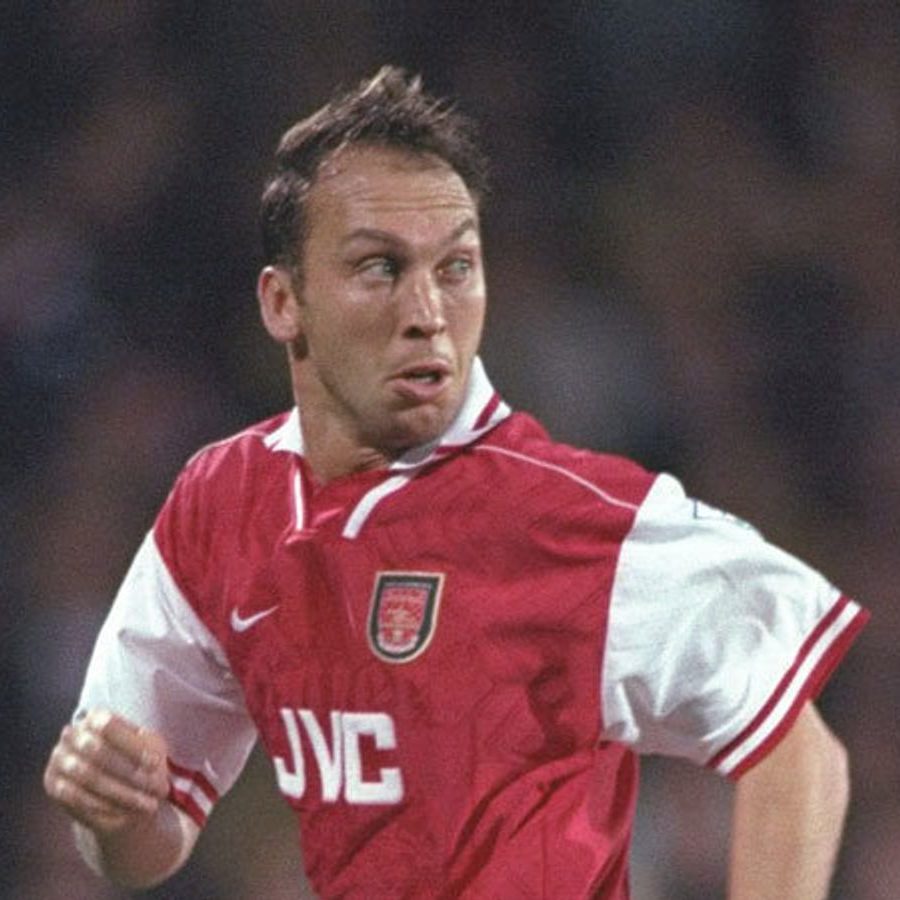
David Andrew Platt
Date of birth: 10 June 1966
Place of birth: Chadderton, Lancashire, England
Nationality: English 🏴
Height: 5 ft 10 in (1.78 m)
Position(s): Midfielder
Arsenal Senior Career: 1995-1998
Senior Apps/Goals: XXX
General Information
David Platt (born 10 June 1966) is a former English midfielder who played for Arsenal between 1995 and 1998. Renowned for his late runs into the box, leadership, and knack for scoring crucial goals, he added both experience and quality to the team. Though his Arsenal spell came towards the end of his career, he contributed to one of the club’s most successful eras in the late 1990s.
Early Career and Rise in England
Platt was born in Chadderton, Lancashire, and started his professional career with Manchester United’s youth system. However, he did not make the breakthrough there and instead rebuilt his path at Crewe Alexandra. At Crewe, he transformed into a goalscoring midfielder, catching the eye of bigger clubs.
A move to Aston Villa in 1988 propelled him into the spotlight. He scored regularly from midfield and became known for his work rate and intelligent movement. Therefore, it was no surprise when he earned a call-up to the England national team. His international reputation soared during the 1990 World Cup in Italy, where his spectacular volley against Belgium became one of England’s most iconic goals.
European Adventures Before Arsenal
After his success with England, Platt moved abroad, enjoying spells in Italy with Bari, Juventus, and Sampdoria. These years shaped his game further, as he adapted to Serie A’s tactical demands. He improved his positional awareness and added composure to his natural energy.
By the mid-1990s, Platt had returned to England with a wealth of European experience. Arsenal recognised that his leadership, goals, and professionalism could strengthen a squad aiming to challenge for trophies again.
Joining Arsenal in 1995
In the summer of 1995, Arsenal signed Platt from Sampdoria. At 29, he was no longer the youthful prospect of Aston Villa, but he remained a midfielder of international pedigree. His arrival added depth and experience to the squad managed initially by Bruce Rioch.
Platt scored on his debut against Middlesbrough, an early sign of his knack for arriving in the right place at the right time. His ability to make late runs into the box gave Arsenal a valuable attacking outlet. In addition, his calmness under pressure and experience in Europe gave balance to a team mixing youth and senior players.
Arsenal Under Arsène Wenger
When Arsène Wenger arrived in 1996, Platt became an important figure in the transition. Wenger valued his professionalism, fitness, and adaptability. While no longer the explosive midfielder of his Villa days, he offered tactical discipline and leadership on and off the pitch.
The 1997–98 season proved decisive. Platt contributed to Arsenal’s historic double, as the club won both the Premier League and the FA Cup. He played an important supporting role in midfield, rotating with Patrick Vieira, Emmanuel Petit, and others. Although he did not always start, his presence was vital in maintaining depth and experience during a demanding campaign.
Memorable Moments in an Arsenal Shirt
Platt scored several key goals for Arsenal. One of the most memorable came against Manchester United in November 1997. Rising above the defence, he scored a decisive header that helped Arsenal secure a vital victory in the title race. That goal reflected his trademark timing and ability to step up when it mattered.
In cup competitions, he also made valuable contributions. His composure and leadership helped Arsenal navigate tense matches. Supporters respected his reliability and work ethic, even if he was not always the star of the team.
Playing Style and Strengths
Platt built his career on intelligence and timing. He was not the fastest or most flamboyant player, but he had a rare instinct for when to move forward. His late runs into the penalty area often caught defenders off guard, leading to crucial goals.
In addition, he brought calmness in possession and the ability to link midfield with attack. His experience in Italy added tactical discipline, making him comfortable in tight games where control mattered most. Moreover, his leadership qualities influenced younger teammates, who benefitted from his guidance.
Challenges in His Arsenal Career
By the time Platt joined Arsenal, he was in the later stages of his playing career. Therefore, consistency and fitness became challenges. He faced competition from younger, more dynamic midfielders such as Vieira and Petit. As a result, he often played a supporting role rather than being a guaranteed starter.
Yet he accepted that role with professionalism. Instead of complaining, he used his experience to help the team. His attitude made him a valuable squad member during a period of transition for Arsenal.
Legacy at Arsenal
Although Platt’s Arsenal career lasted only three seasons, it came at a pivotal time. He was part of the squad that won the double in 1998, one of the club’s greatest achievements. His goals, leadership, and experience added depth and stability when Arsenal needed it.
Overall, his contribution might not match the long-term impact of others from that era, but it was significant. He bridged the gap between the old guard and Wenger’s new generation. Supporters remember him as a player who delivered key goals and carried himself with professionalism.
Life After Playing
After leaving Arsenal in 1998, Platt moved into coaching and management. He managed Nottingham Forest briefly and later took on coaching roles with the England national team and Manchester City. His deep knowledge of the game allowed him to pass on experience to the next generation.
Arsenal and Platt’s Career in Perspective
Platt’s time at Arsenal adds an important chapter to his career. He had already shone at Aston Villa, England, and in Italy, but at Arsenal he experienced major team success. Winning the Premier League and FA Cup double gave him silverware that his earlier career had lacked.
His Arsenal story highlights the value of experienced professionals in building a winning team. He may not have been the central star, but he played his part in one of Arsenal’s most memorable campaigns.
| Season | Appearances | Goals |
| 1995/96 | 32 | 6 |
| 1996/97 | 34 | 5 |
| 1997/98 | 41 | 4 |

